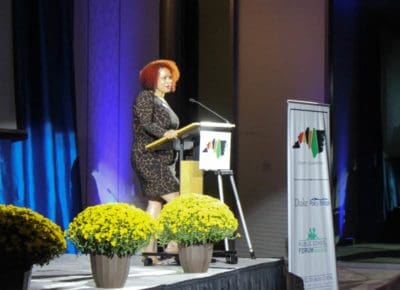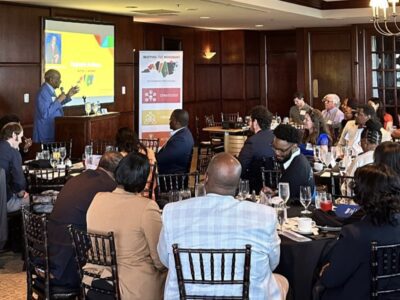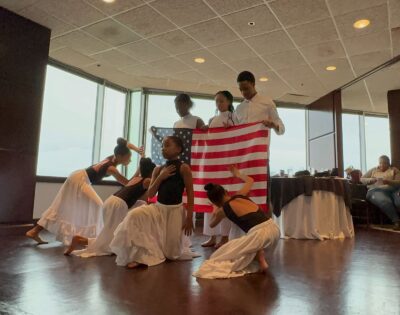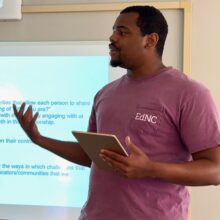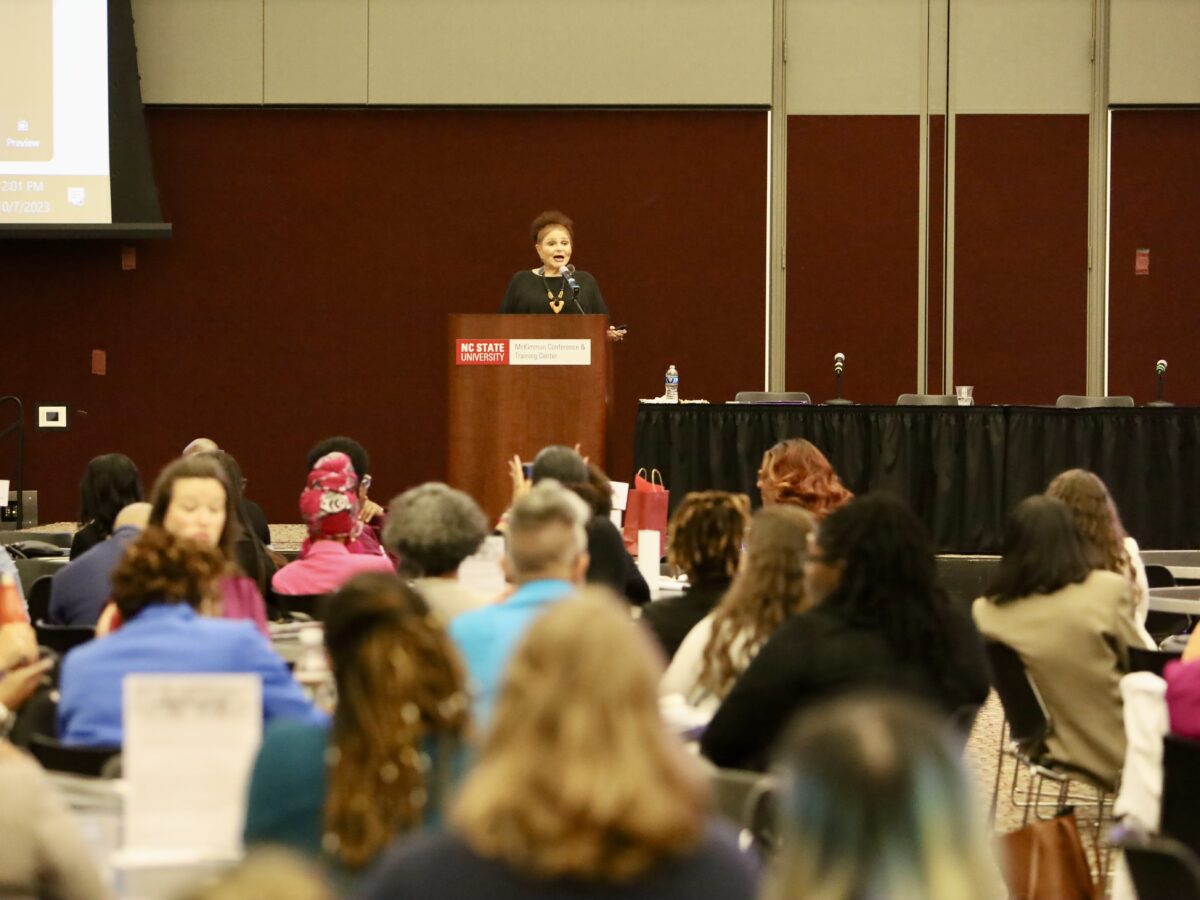
Dr. Dudley Flood, the namesake of The Dudley Flood Center for Educational Equity and Opportunity (Flood Center), is an educational trailblazer, who served as a teacher and principal before being tasked with helping desegregate schools in North Carolina. He was also a coach, a role that taught him how to take hits and keep going, a measure known as “yards after contact.”
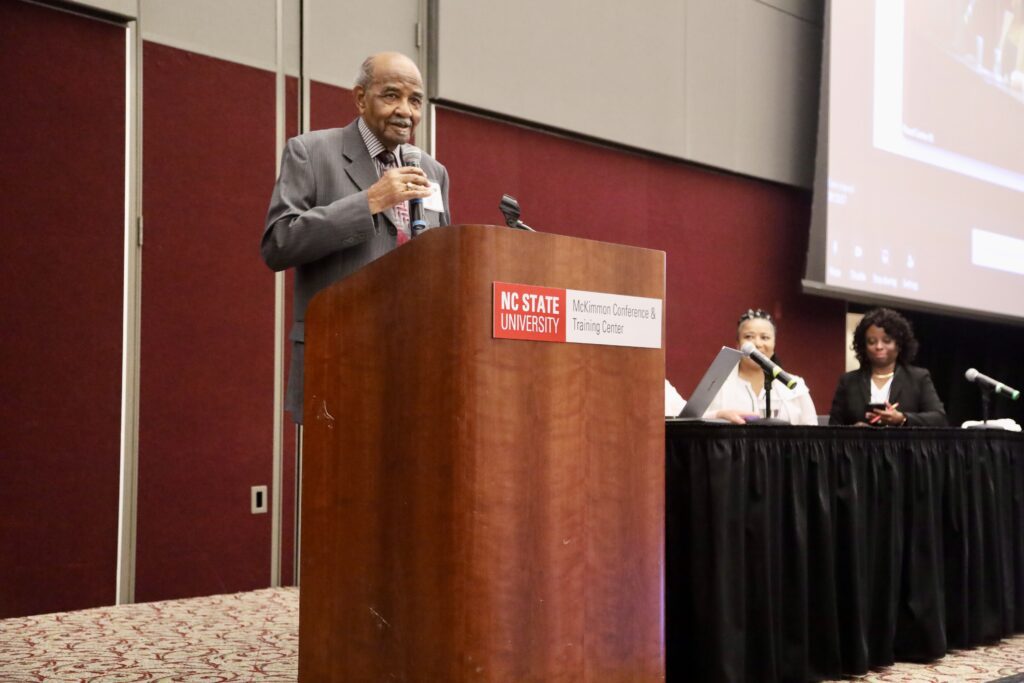
Speaking to a group of over 800 diverse education stakeholders at the Color of Education Summit (Color of Ed) in Raleigh on Oct. 7, Dr. Flood shared the importance of yards after contact not just in football but in life. He said what is most remembered is how one advances beyond the obstacles along the path forward.
Focused on the theme of co-creating equitable spaces in education, Color of Ed is an evolving story that builds upon a sense of collective power — a power that was ultimately met by a simple yet profound call to action from the former coach and forever educator, Dr. Flood.
“You have to go out now and run the play.”
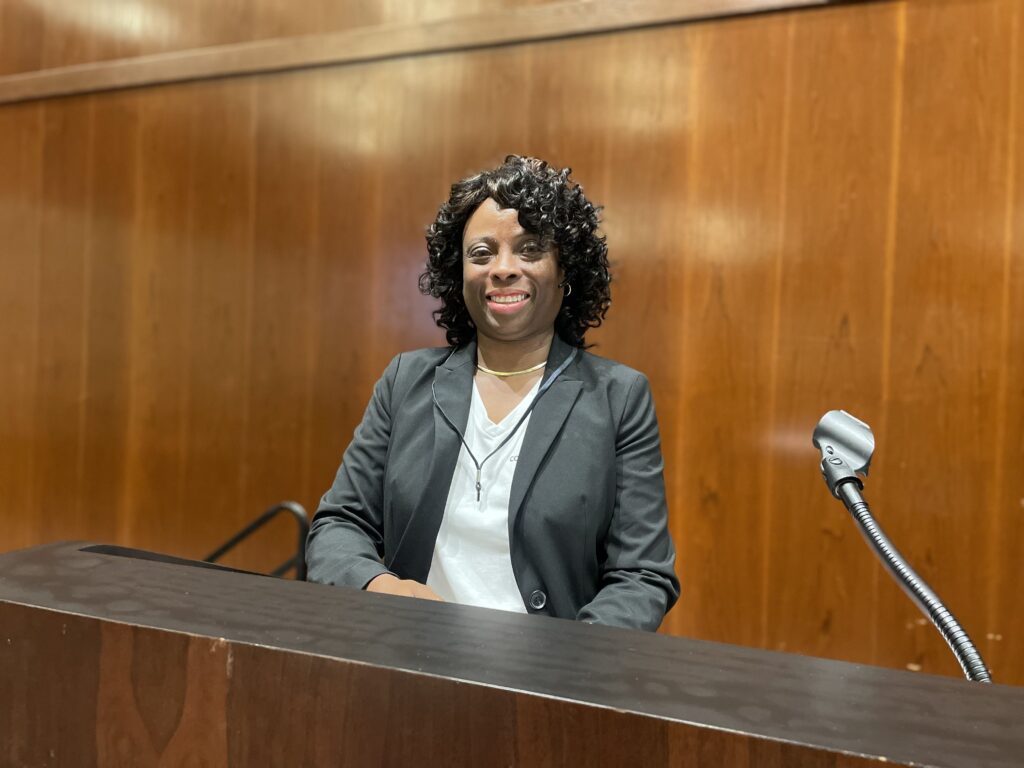
Color of Ed is a partnership between the Dudley Flood Center for Educational Equity and Opportunity, Public School Forum of North Carolina, Duke University’s Samuel DuBois Cook Center on Social Equity and Center for Child and Family Policy, and Sandra Wilcox Conway of Conway and Associates. This year’s summit focused on co-creating equitable spaces in education by recognizing history, celebrating success, and cultivating collective power.
The history is relevant
The landmark Supreme Court decision in Brown v. Board of Education labeled “separate but equal” public schools unconstitutional. Over a decade later, Dr. Flood and his late colleague, Gene Causby, were challenged with venturing across the state in the name of desegregating North Carolina’s public schools.
Faced with polarized viewpoints regarding their effort, the duo adopted an unconventional approach to establishing common ground among all who listened. As Dr. Flood previously shared, he was on his way to a town hall meeting where they were anticipating members of the Ku Klux Klan, Rights of White People, Black Panther Party, and the Southern Christian Leadership Conference when he decided to stop at a store for a soft drink.
“I saw this little paddle that had a ball on the end of it and I noticed the ridge around it. One side was green, and one side was red. So, when we opened our meeting, I said before we begin our discussion, ‘Tell me what color this ball is?’ They all said red. I said, ‘No, it’s green.’ They yelled, ‘Red! Red!’ I said before we get too argumentative, I turned it around. They all said, ‘Oh, your side is green.’ I said, ‘Yeah on my side. But, if you come around and see how things look to you from my perspective and I come around and see how it looks to you, we may get a conclusion that’s usable to all of us.’”
Dr. Dudley Flood
At Color of Ed, attendees highlighted the importance of sharing these stories while also calling attention to the need for honest language.
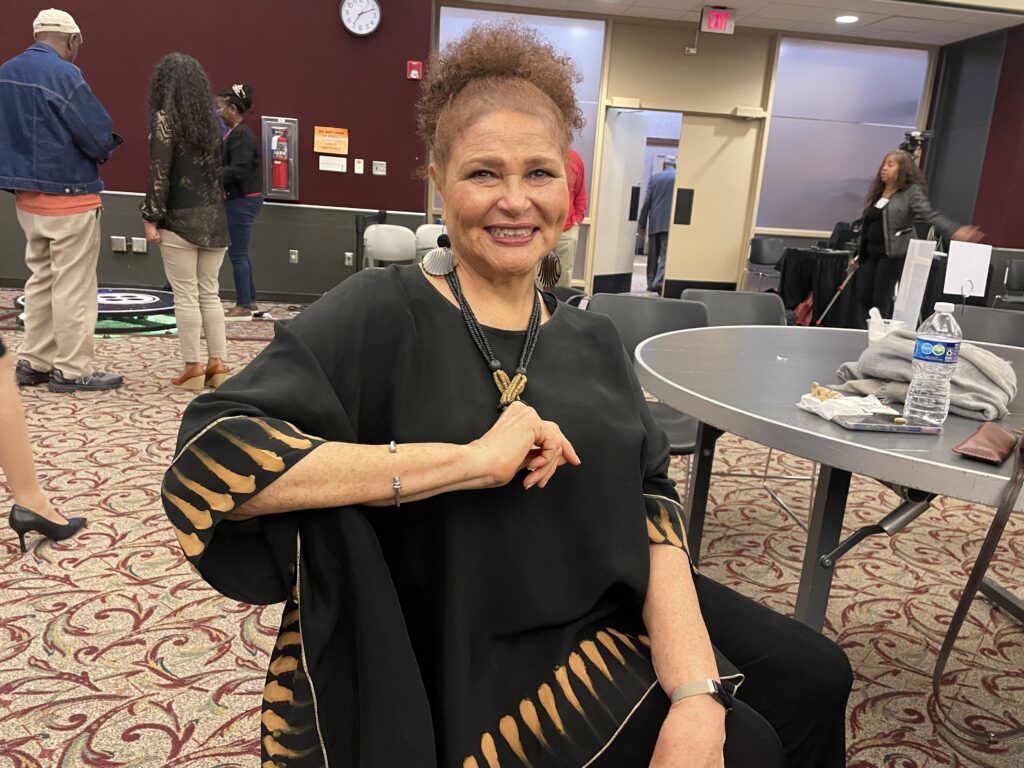
As part of her keynote address, award-winning author, researcher, and retired professor Dr. Lisa Delpit read aloud the following statements from U.S. leaders and scholars that are indicative of the harmful racist narratives created about people of color throughout the nation’s history.
“(Black people are) inferior to the whites in the endowments of both body and mind.”
Thomas Jefferson, author of the Declaration of Independence and third U.S. president
“Blacks and other ethnic minority children are untenable beyond the nearest rudiments of training. No amount of school instruction will ever make them capable citizens. Their dullness seems to be racial.”
Lewis Terman, former Stanford professor and president of the American Psychological Association
“If you wanted to reduce crime, and you could, if that were your sole purpose, you could abort every Black baby in this country and your crime rate would go down.”
William Bennett, former U.S. Secretary of Education
For Dr. Delpit, these are just a select few of many examples that illustrate stories that, for centuries, continue to “languish in the larger American psyche about those of African descent.” She asserted that it is those beliefs that “become the stories with which we are all indoctrinated, whether we are consciously.”
Katy Gash, eighth grade math teacher and member of the first cohort of the STEM Educators for Equity and Diversity (SEED) Fellowship, also highlighted the importance of honest language.
“Too often there are words that are not allowed to be used in the conversations,” she said, which can prevent change. She shared that in order to correct wrongs, conversations need to be had that may have uncomfortable language for some people.
“It’s not fair to keep centering the comfort of some while allowing our kids of color to fall through the cracks,” she said.
Celebrating success
In addition to talking honestly about our history, Color of Ed presenters and attendees highlighted the importance of celebrating success in Black communities.
Maya McClain and Morgan Winston, sophomores at South Mecklenburg High and East Mecklenburg High respectively, shared their story of honoring the contributions of Dorothy Counts-Scoggins, the first African-American student to attend the all-white Harding High School in Charlotte in 1957.
Search the name Dorothy Counts-Scoggins in your browser, and you are bound to come across a multitude of black and white images depicting a young lady being surrounded and harassed by a mob of white people. Though Counts-Scoggins would ultimately leave the school in light of safety concerns, a new generation of leaders have cemented her legacy on the very sidewalks where she made history.



In 2019, McClain and Winston were fifth graders at Irwin Academic Center, the location formerly known as Harding High. After learning about Counts-Scoggins history, the student leaders stated they were surprised that “nothing had been done to honor her bravery.” Compelled to act, the students successfully got a bench at the school dedicated in honor of Counts-Scoggins.
“We wanted her to know that she is loved and appreciated,” they said.
This act of service would prove to be just the start of a more extensive initiative to promote the history and success of African Americans in Charlotte. With the intent to educate and empower, especially the younger generation, McClain and Winston have since worked on a documentary in partnership with 450 Multimedia and the Harvey B. Gantt Center that not only looks at the hardships but also celebrates the excellence of the Black community.
“We send the message that they stand on the shoulders of determined individuals who fought extremely hard so that they have the opportunity to succeed but that they also have the responsibility to continue the fight for a better world,” the girls said.
The documentary is expected to be a part of the Harvey B. Gantt Center’s upcoming virtual exhibit.
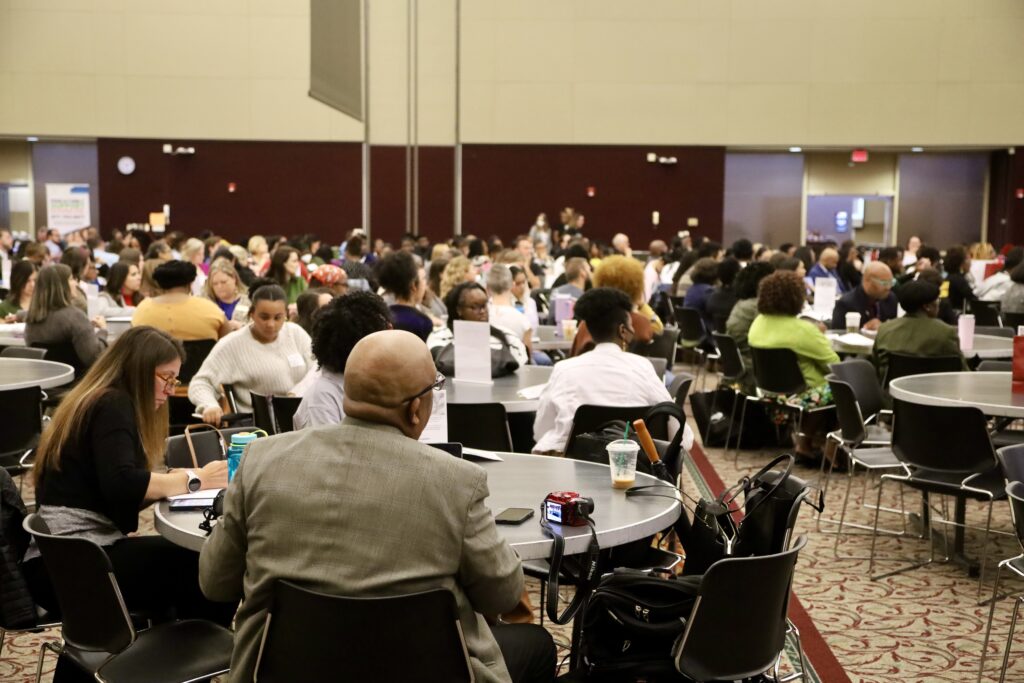
Dr. Delpit said she is in the business of promoting fugitive pedagogy. Accredited to Jarvis Givens, fugitive pedagogy acknowledges the commitment of Black Americans to education in the face of tremendous opposition. Whether that opposition was the laws that once existed which penalized their education, or the violence experienced in the process of desegregation, the concept highlights the persistence and innovation of Black people across history in their pursuit of education.
For Dr. Delpit, to be in the business of promoting fugitive pedagogy is to be in the “business of helping parents, community members, teachers, principals, and committed central office staff to focus on what needs to be done” to help children learn in spite of restrictions. A part of that work is changing the aforementioned negative beliefs and stories that exist at a subconscious level. She gave four examples of ways to create change:
- Countering negative societal stereotypes by celebrating children’s brilliance and unique gifts.
- Incorporating culturally influenced learning modalities to engage students.
- Building relationships and creating a sense of belonging.
- Connecting content to who they are and what they care about.

“Neuroscience suggests that we don’t have to get rid of old stories. We just need to create new ones. Belief in the new stories overrides the old ones.”
Dr. Lisa Delpit, author, researcher, retired professor, and Color of Ed keynote speaker
Jerry Craft, author and illustrator of several publications, including the comic strip Mamas Boyz and his Newbery Medal-awarded graphic novel, New Kids, said he became an author to “make the books that I wish I had as a kid.” In his speech at Color of Ed, Craft recalled continuously encountering stereotypical narratives about Black characters in many of the books and other media to which he was exposed.
“Every kid who looked like me had the weight of the world on their shoulders,” Craft said.
Within his books, he has aimed to alter the depiction of struggling Black families, or, by writing about a middle school class trip to Paris, simply position his characters in spaces that give kids “access to dream.”
Craft shared that he has incorporated lived experiences into the novels, such as the less written about challenges he faced being one of few Black students after transferring to a new school. It is stories such as this that made Craft a target of book bans, to which he inquires, “It’s okay to live the life, but not write about it?”
On cultivating collective power
As referenced in the summit’s theme, “The Path Forward: Co-Creating Equitable Spaces,” a primary focus for the event was to highlight the importance of collaboration in each of the endeavors of the greater collective. More specifically, many emphasized the need for engaging with the community.
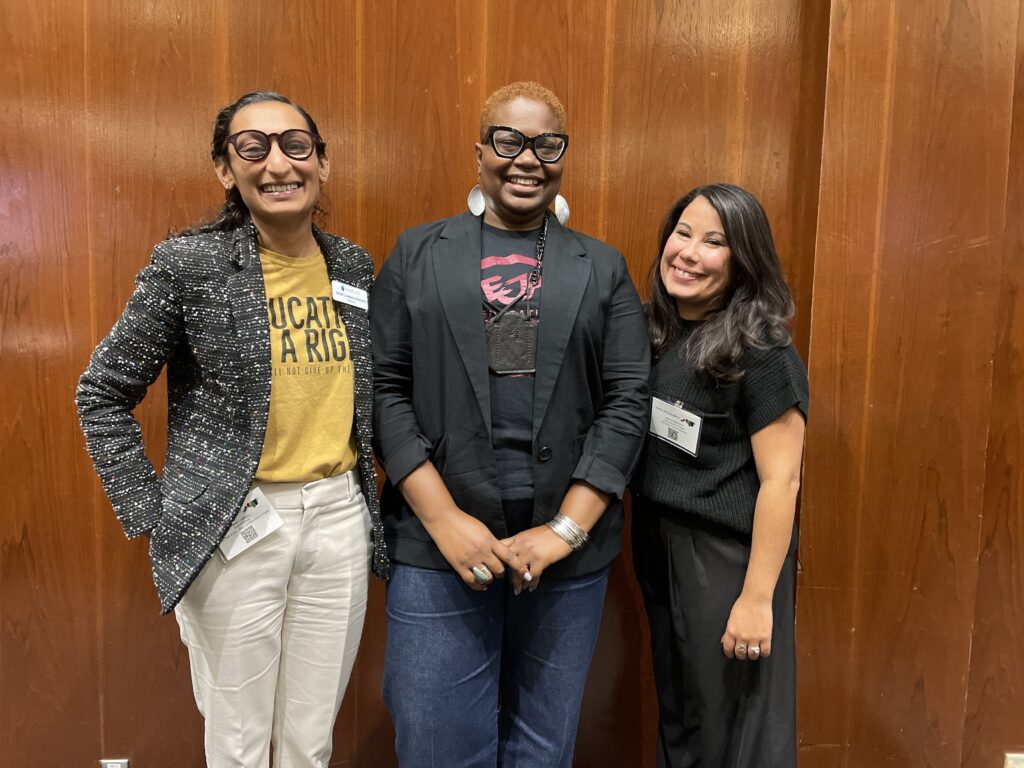
Education Justice Alliance, a Wake County-based nonprofit working for a more equitable public education system, and the Right to Education Project, Legal Aid of North Carolina’s statewide education justice project, shared about the work of addressing the inappropriate and inequitable use of short-term suspensions in public schools.
In a session titled, “Nothing for us, without us,” Letha Muhammad, Jenice Ramirez, and Hetali Lodaya spoke about their intentionality of centering community in their partnership. Muhammad and Ramirez are co-executive directors of EJA. Lodaya is a staff attorney and Equal Justice Works Fellow sponsored by Latham & Watkins. Their partnership is executed through a community lawyering model, one in which Lodaya states that the local community should be the ones setting the goals and driving the strategy.
Muhammad added that their approach “centers the expertise of people on the ground,” acknowledging them as the people “who can actually come up with the solutions” while “lawyers work alongside to help cultivate that change.”
Regarding the sustaining partnership, Ramirez noted bandwidth to address the multitude of cases as a top challenge for any individual organization, reinforcing the benefit of collaboration and sharing responsibility.
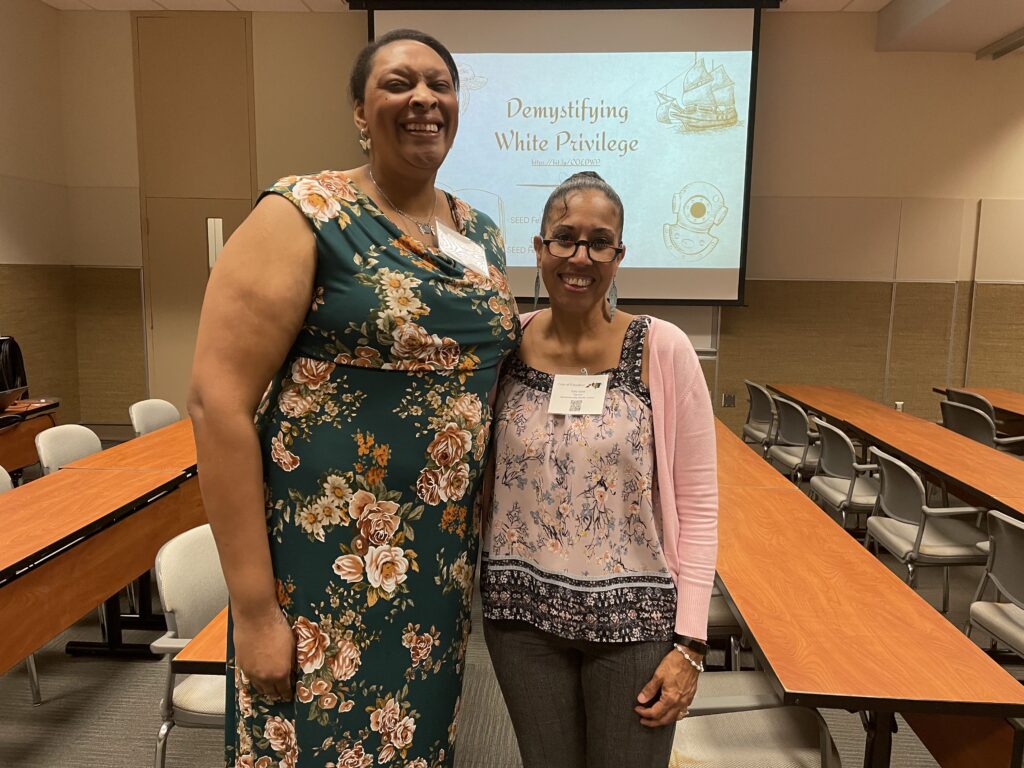
Dr. Michelle Ellis, academic facilitator and AVID elective teacher, also offered remarks from a different angle regarding community.
“We expect as educators that the community come to us, and we’re centering the school, and it’s not that way anymore,” she said.
Further, Dr. Ellis explained how, for many individuals, there may be unresolved tensions in the relationship with the educational institutions, interfering with their desire to go to the schools.
“We need to go out into the community,” Dr. Ellis said.

Ernest and Tamara McClain chimed in about the need for communication and collaboration among communities and schools. As parents of Maya McClain, they described her as academically gifted, but very shy in her earlier school years. Growing concerned about their daughter being overlooked in the referral for screening, the McClains recognized the need to advocate for their child’s future education.
In their testament to the power of representation, they specifically offered appreciation to a Black educator who was willing to assess not just their daughter but all students for Academically or Intellectually Gifted (AIG) programs to ensure that students like Maya were not dismissed from opportunities that supported their development. The McClains offered encouragement for parents to be more present in their children’s schools and establish partnerships with school personnel to support students.

Rev. Suzanne Parker Miller, executive director of Pastors for North Carolina Children, feels that partnerships for education should extend to faith-based organizations. Whether it’s school supply drives or teacher appreciation efforts, she stated that many churches have some type of relationship with their local school systems.
Yet, especially when questions come up like, “Why do our teachers not have the supplies,” Parker Miller believes there is more that can be done to create change in education as a system.
More specifically, through their Mission Amplify Curriculum, they are encouraging these organizations to be more active in their support and advocacy for public schools through attention to legislation. Parker Miller emphasized,“We just have to be nonpartisan in that, but we can talk about public education; that’s a faith issue.”


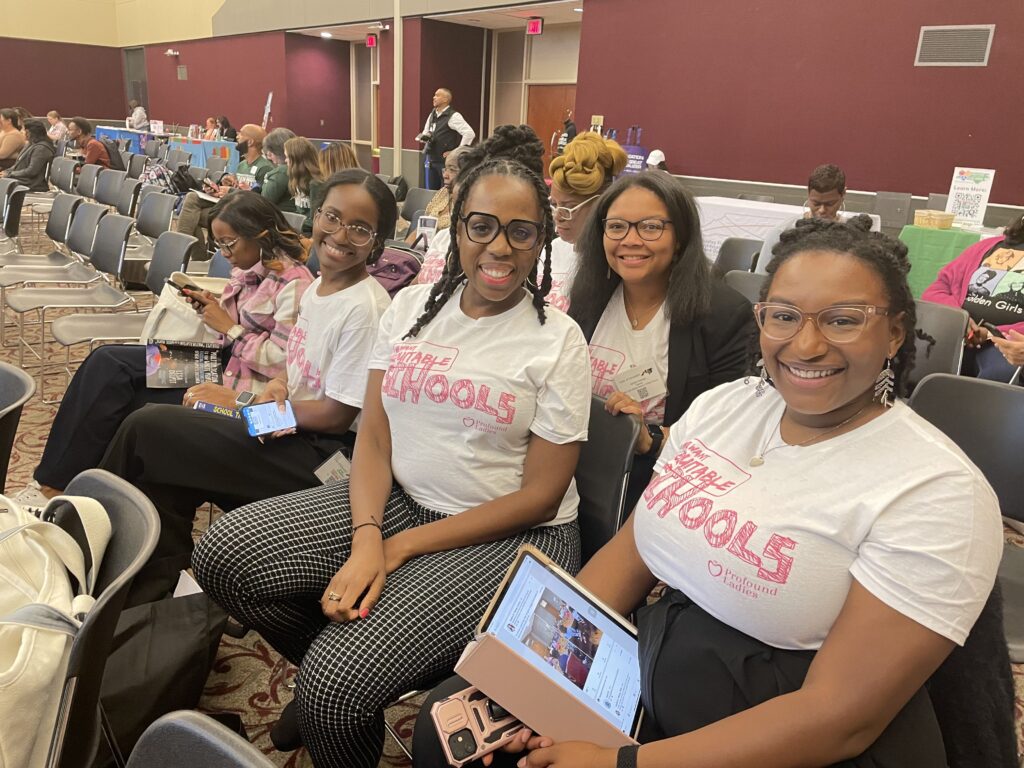
Many other organizations and speakers offered insight into additional areas to address equity in education. Again, as the summit’s theme suggested, the overarching focus was directing combined efforts to common goals.
Color of Ed highlighted the need for multi-level and multi-directional approaches to the same issues. Moreover, the convening drove home the understanding that there is a role for everyone: teachers, parents, students, nonprofits, legislators, faith-based organizations, schools, and many other stakeholders in education.
This takes attendees back to Dr. Flood’s simple, but profound, call to action.
“You have to go out now and run the play.”
Recommended reading
